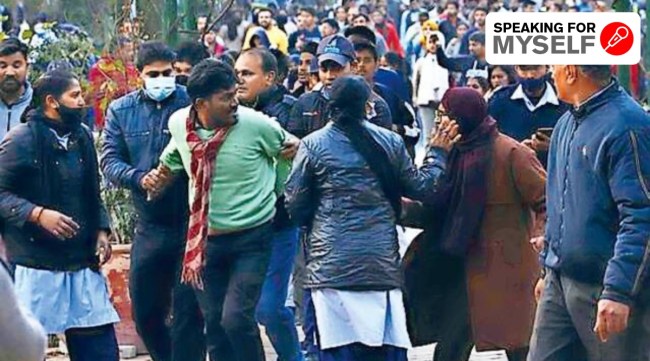Opinion DU students suspended over BBC documentary screening: University must open up the world for its students, not draw hard lines
The space of the university is one that helps us shape our identities in larger ways. Speaking out, taking a stand, protesting against a perceived wrong, is part of the process, not outside it
 DU students, in screening the documentary, and Jamia and AMU students, in leading the anti-CAA protests embodied Freire’s words by resisting integration into majoritarianism and compelled onlookers to engage critically with reality, to engage with the practice of freedom. (Archive)
DU students, in screening the documentary, and Jamia and AMU students, in leading the anti-CAA protests embodied Freire’s words by resisting integration into majoritarianism and compelled onlookers to engage critically with reality, to engage with the practice of freedom. (Archive) Written by Firasha Shaikh
This week, The Indian Express published a report on the Delhi University students facing punishment for screening the banned BBC documentary, India: The Modi Question on campus (‘For 8 students punished by Delhi University over BBC documentary, futures at stake’, March 23). As I read the students’ responses, many of whom came from underprivileged backgrounds, have ambitious dreams and worried parents back home, I got flashbacks of my conversations with classmates in junior college. Many of my friends and classmates were the first in their families to attend college and get a graduate degree. Participating in extracurricular activities like debate competitions, NSS, etc., held a special significance for them. They recounted the respect and recognition they would get from people in their hometown, and the sense of quiet pride on their parents’ faces when they introduced their children as college graduates.
This attachment to higher education institutes, for many of us, is a lifelong one: The space of the university is one that helps us shape our identity and discover who we are as individuals. It opens up the world for us. To have this opportunity blighted by those who are supposed to enable it — governments and university administration — is unsettling.
Reading the rusticated students’ thoughts reminded me of just how much higher education means for young people, especially those from humble backgrounds.
For students from marginalised communities, the university is about more than the degrees it offers. It’s an opportunity to gain the necessary skills and qualifications to improve one’s socioeconomic standing, break intergenerational cycles of poverty, and uplift one’s community.
Unfortunately, this is all elusive for many of India’s students due to the several issues plaguing India’s higher education system. Between the corporatisation of higher education brought on with NEP 2020, the discontinuation of various scholarship schemes meant for minority communities, like the Maulana Azad National Fellowship, anti-reservation sentiment, and discrimination in the classroom — the future of India’s students in general and marginalised students in particular, seems bleak. After crossing numerous obstacles, like regional disparities, income inequality, and caste barriers, for the few students who do make it into the hallowed, gate kept grounds of the university, the opportunity is sometimes brutally cut short because of institutionalised casteism, Islamophobia, and the repression that follows, when one tries to protest and speak out against it. Rohith Vemula, Fathima Latheef, Darshan Solanki — how many more names until this ends?
The defiance of young people is by no means a new phenomenon — from the Young Bengal group in colonial India and the national students’ movement during the Emergency, to recent agitations like the ones that took place in FTII and JNU and the anti-CAA protests which saw the participation of a large number of students. But after the police lathis stop falling and the teargas dissipates, after our fellow students are detained or jailed, and when the rustication and suspension period draws to a close — and the lengthy court battles and disputes with university administrations begin — the desolation and disillusionment sets in.
In Pedagogy of the Oppressed, Paulo Freire writes, “Education either functions as an instrument which is used to facilitate the integration of the younger generation into the logic of the present system and bring about conformity or it becomes the practice of freedom, how men and women deal critically and creatively with reality and discover how to participate in the transformation of their world.”
DU students, in screening the documentary, and Jamia and AMU students, in leading the anti-CAA protests embodied Freire’s words by resisting integration into majoritarianism and compelled onlookers to engage critically with reality, to engage with the practice of freedom. To face the truth — no matter how unsettling and uncomfortable it may be. Perhaps amidst that discomfort, we may, together, chart a path towards justice for all.
The writer is a student and holds a postgraduate degree in political science



